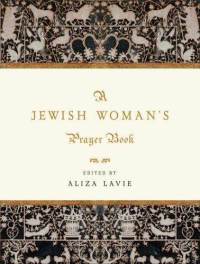Join a community of readers who are committed to Jewish stories
Sign up for JBC’s Nu Reads, a curated selection of Jewish books delivered straight to your door!
Posted by Naomi Firestone-Teeter
 Aliza Lavie, Winner of the 2008 National Jewish Book Award in Women’s Studies for A Jewish Woman’s Prayer Book, just sent me a link to the Dvar Torah she gave at last week’s National Jewish Book Award ceremony. The Dvar Torah was published on Ynet (in Hebrew) here.
Aliza Lavie, Winner of the 2008 National Jewish Book Award in Women’s Studies for A Jewish Woman’s Prayer Book, just sent me a link to the Dvar Torah she gave at last week’s National Jewish Book Award ceremony. The Dvar Torah was published on Ynet (in Hebrew) here.
She also sent me her Award speech from the ceremony:
Women’s Prayers are Coming Home
This award is not mine alone. I have the privilege of having served as the voice of forgotten women, and of their prayers and life stories which have all but disappeared. I dedicate this award to their memory and in their honor: to our mothers and grandmothers, and to their mothers and grandmothers. To the great matriarchs of us all.
Throughout the generations – from Miriam the prophetess, through Donna Gracia, Freiha the daughter of Rabbi Avraham of Morocco, Fanny Neuda of Moravia, and Toby Trackeltaub, who wrote a 6‑line Haggadah in Auschwitz – women have been busy addressing needs. Women noted that in their societies, Jewish education was not being extended to girls – and they did something about it. Women in the Jewish Diaspora – in the east and west alike – wrote texts and prayers in the local languages – Yiddish, Ladino, Judeo-Arabic, and German – for happy moments and for times of sadness. These women paved their own road, by themselves and for themselves, from the depths of the heart; from their souls.
I view the acceptance of this important award as an expression of the very moving and exceptional acceptance of the ancient texts that are all at once coming back into our lives, into the here and now. They are resuming their role in the texture of our lives – both in practice and as inspiration for continued research. The enthusiasm that has greeted this collection, transcending all the usual sectarian divisions and barriers, is an expression of a feeling, of the longing for the world of our mothers and grandmothers, for the feminine Jewish sphere – a world that has been left behind; a longing for communities that were destroyed, for synagogues that were abandoned, and for the secret of Jewish women.
It is my hope that this award will encourage many others to ask questions. Wonder is the root of all knowledge. I grew up with women who spoke with God, and I was astonished to discover, as an adult, the disdain in many quarters towards them. I set off on a journey that lasted three years, to trace their footsteps and their secret. And permit me a word about realizing a dream: even if no-one around you believes in your work, even if they scorn it and refuse any assistance – if it burns in your heart, go with the dream. On your way you will discover good people who will help and who will believe along with you.
Women’s prayers, and the process of making them accessible, have touched a raw nerve amongst Israeli society, amongst the Jewish world, and among many others. The task awaiting our generation is to locate and identify this spark, to know how to tell our story using contemporary tools and through modern channels, and to transform it if not into a blazing fire, then at least into an eternal light.
Aliza Lavie, Ph.D. is one of the most recognized public advocates in Israel today. A former Member of Knesset, Dr. Lavie served as chairperson of the Committee on the Status of Women and Gender Equality in Israel’s Knesset. She is the Chairperson of the Israel Film Council and the author of five books, including A Jewish Women’s Prayer Book, a 2008 National Jewish Book Award winner.